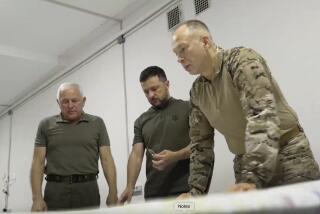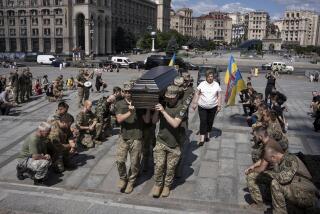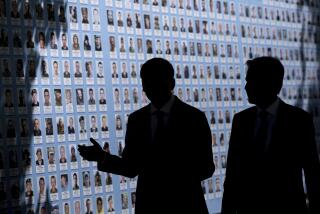Guns Fall Silent in Chechnya as Lebed Makes 2nd Visit
- Share via
GROZNY, Russia — Bashir raised his fist in triumph as a jeep full of Chechen separatist warriors like him headed past his roadside checkpoint in the wasteland of ruined factories that makes up southwest Grozny.
“Allahu akbar! (God is great!),” he yelled happily, with the wind catching his long green-velvet headdress. Fists, guns and smiles flashed in answering salute.
On Thursday, smoke still rose from the war-ravaged capital of Chechnya, but the guns fell silent nine days after separatists broke back into the city they abandoned last year to advancing Russian troops. And at least for the moment, the separatists were left in charge.
Guns over their shoulders, they strolled the city center and the streets of Leninsky, Oktyabrsky and Chernorechniye, reporters returning from those neighborhoods said.
The lull in fighting coincided with a lightning visit to Grozny by Russian security chief Alexander I. Lebed. He flew into the Russian military base at Khankala airport outside the city to shore up his new initiative for ending 20 months of war over the southern republic’s dream of independence.
A truce, announced after an earlier, unexpected visit by Lebed to meet Chechen rebels last weekend, was supposed to have started Wednesday. But it was only halfheartedly observed until Lebed flew back into town, armed by Russian President Boris N. Yeltsin with sweeping new powers to resolve the conflict.
While Chechen field commander Aslan Maskhadov ordered his men Wednesday to lay down their guns, his Russian counterpart, Lt. Gen. Konstantin B. Pulikovsky, at first denied an agreement existed. Russian planes bombed a refugee column and the village of Komsomolskaya on Wednesday.
In Grozny, Russian forces launched shells overnight, and snipers on both sides continued to duel Thursday. But Lebed, who unlike earlier Russian peacemakers has proved eager to make contact with the rebel leaders and hear their demands, made it clear he had now had enough foot-dragging by his own side.
Emerging from talks with Russian generals--with the downcast leader of the pro-Moscow puppet government, Doku Zavgayev, trotting alongside--Lebed told reporters that the war was being dragged out for “commercial reasons.”
Throughout the war, Russian soldiers have reportedly been selling their weapons to Chechen fighters, and this pattern is believed to be repeated higher up the administrative ladder by corrupt officials. Lebed said he would name what he contemptuously called the “heroes” of the latest bloodshed at a news conference in Moscow today.
The Muslim Chechens, who pride themselves on their austere morality, sneer openly at what they call Russian amorality. In turn, most Russians see the dark-skinned Chechens as a criminal ethnic minority. This hostility, dating back through two centuries of continual conflict, has undermined all previous peace attempts.
But Lebed said he was having no truck with racism. “The first thing we have to do is stop killing people--and I don’t care what ethnic group they are from,” he said Thursday.
The plain-spoken retired paratroop general, appointed to run Russia’s dealings with Chechnya only hours before his Sunday trip south, first won popularity at home by denouncing the war.
Chechens in Grozny on Thursday were guarded about his peace initiative, mostly agreeing that he seemed to be serious but adding that the powerful lobby of Russians who covertly back the war could yet outwit him.
Ordinary people here, trapped in their cellars for more than a week, took advantage of the lull in fighting brought on by Lebed’s visit to get themselves out of town. Long lines of overloaded cars backed up on broken bridges, which have been haphazardly repaired with sheets of metal. The plates creaked and clanked as buses, trucks, pedestrians and jeeps containing rebel fighters streamed out to the countryside.
Lukman Bakhayev, whose wife, 6-year-old son and baby were packed into their tiny car between pots, pans and blankets, said he feared that, as soon as Lebed left, the Russians would again attack his home near Grozny’s burned-out railway station. “Our boys are controlling everything around there right now,” he said. “But we saw the Russians at the checkpoint--like the dogs they are--shoot one of their own Russian women right in the street. Today the [Chechen] fighters buried her, but we’ve had enough.”
Everywhere, escaping Chechens repeated panicky stories of atrocities by Russian soldiers, now cooped up in their bases around Grozny.
Mistrust of Moscow’s motives also clouded most people’s expectations of the future.
Shamil Basayev, the most influential Chechen separatist and leader of the attack on Grozny, told Radio Liberty that he was personally against the truce, saying he thought it would give the Russians a chance to regroup after their humiliating defeat. He claimed that the Russians had lost 2,300 men, 200 armored vehicles, 10 helicopters and three planes in the nine days of fighting. His estimates appear to be exaggerated, but Russian army losses--at least 200 soldiers by its own count--are the heaviest since it captured Grozny in early 1995.
More to Read
Sign up for Essential California
The most important California stories and recommendations in your inbox every morning.
You may occasionally receive promotional content from the Los Angeles Times.










